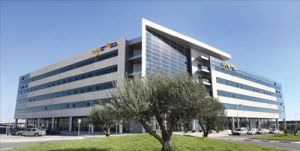
Cyber Security Unit Drives Israel’s Internet Economy
Cyber Security Unit Drives Israel’s Internet Economy
December 9, 2014
Christian Science Monitor — Over the summer, in the middle of the two-month-long Operation Protective Edge, representatives of some of the biggest names in tech crammed into the stairwell of a Tel Aviv skyscraper to wait out Hamas rocket fire.
Wearing Sequoia Capital name tags and TechCrunch t-shirts, they squeezed against one another, passing the time by talking about the Paris startup scene and the success rate of Iron Dome, Israel’s missile defense system.

Advanced Technologies Park, Beer-Sheva
They came to Tel Aviv for the demo day of a uniquely Israeli brand of startup incubator: one conducted by graduates of Israel Defense Forces Unit 8200 – the Israeli NSA.
It was a fitting reminder of the close ties between Israel’s Silicon Wadi (the nickname for Israel’s startup ecosystem) and the country’s military establishment.
One group trying to capitalize on the link between military training and startup success is Jerusalem Venture Partners, an Israeli venture capital group with a $1 billion investment fund that opened its new Cyber Labs in Beer-Sheva, in cooperation with BGU.
Cyber security is a booming industry for Israel. Israeli cyber security startups raised more than $140 million in funding in 2013, according to the Israel Venture Capital Research Center, and Israel represents 13 percent of global cyber security research and development spending.
Beer-Sheva is quickly becoming the epicenter of the Israeli cyber security community and a big part of that is thanks to the strategic military intelligence units that are moving nearby.
The city also boasts Ben-Gurion University, the first in Israel to offer cyber security graduate studies and first in the country in the number of practical engineers it graduates.
And positioned right in between the army units and the University is the Advanced Technologies Park home to Deutsche Telecom, IBM, and Lockheed Martin research centers.
The Israeli government’s heavy investment in startup funding, and specifically in cyber defense, plays its part as well. Israel spends more on R&D relative to its size than any other country in the world.
Early this year, Prime Minister Benjamin Netanyahu opened Israel’s first CyberTech Conference, which was attended by more than 450 global heads of industry and cybersecurity agencies, including 50 from the White House and the US Department of Homeland Security. In his speech, he stressed his government’s focus on growing Israel’s military-tech ecosystem In Beer-Sheva.
“You have our security outfits, our university, and an industrial park all within walking distance of 100 yards,” says Netanyahu.
“That’s called a cyber-hub,” he says. “It’s a big thing.”



